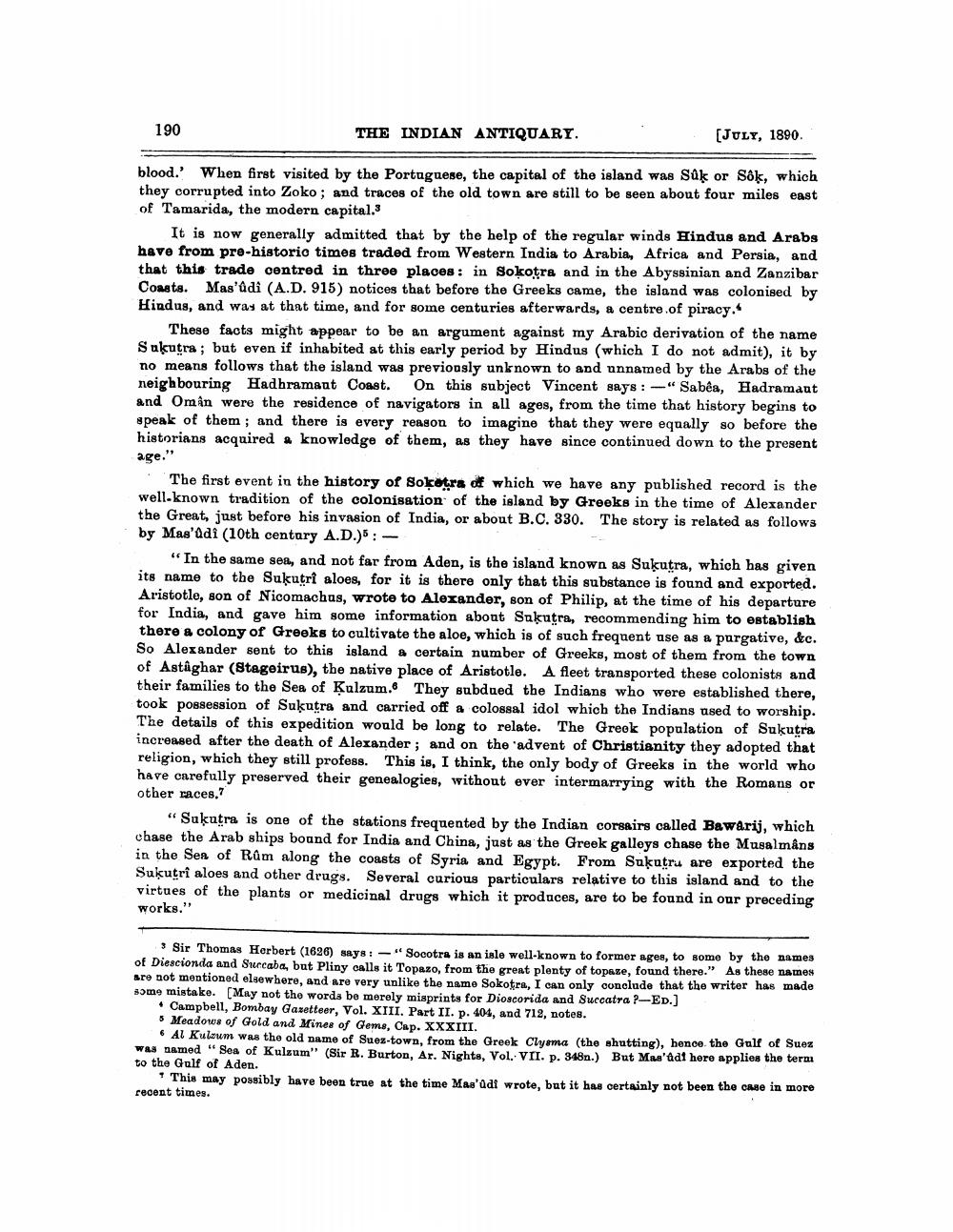________________
190
THE INDIAN ANTIQUARY.
[JULY, 1890.
blood.' When first visited by the Portuguese, the capital of the island was Sûk or Sôk, which they corrupted into Zoko; and traces of the old town are still to be seen about four miles east of Tamarida, the modern capital.3
It is now generally admitted that by the help of the regular winds Hindus and Arabs have from pre-historic times traded from Western India to Arabia, Africa and Persia, and that this trade centred in three places: in Sokotra and in the Abyssinian and Zanzibar Coasts. Mas'udi (A.D. 915) notices that before the Greeks came, the island was colonised by Hindus, and was at that time, and for some centuries afterwards, a centre of piracy.
These facts might appear to be an argument against my Arabic derivation of the name Sukutra; but even if inhabited at this early period by Hindus (which I do not admit), it by no means follows that the island was previously unknown to and unnamed by the Arabs of the neighbouring Hadhramaut Coast. On this subject Vincent says: "Sabêa, Hadramaut and Oman were the residence of navigators in all ages, from the time that history begins to speak of them; and there is every reason to imagine that they were equally so before the historians acquired a knowledge of them, as they have since continued down to the present age."
The first event in the history of Soketra of which we have any published record is the well-known tradition of the colonisation of the island by Greeks in the time of Alexander the Great, just before his invasion of India, or about B.C. 330. The story is related as follows by Mas'udi (10th century A.D.)5:
"In the same sea, and not far from Aden, is the island known as Sukutra, which has given its name to the Sukutri aloes, for it is there only that this substance is found and exported. Aristotle, son of Nicomachus, wrote to Alexander, son of Philip, at the time of his departure for India, and gave him some information about Sukutra, recommending him to establish there a colony of Greeks to cultivate the aloe, which is of such frequent use as a purgative, &c. So Alexander sent to this island a certain number of Greeks, most of them from the town of Astighar (Stageirus), the native place of Aristotle. A fleet transported these colonists and their families to the Sea of Kulzum. They subdued the Indians who were established there, took possession of Sukutra and carried off a colossal idol which the Indians used to worship. The details of this expedition would be long to relate. The Greek population of Sukutra increased after the death of Alexander; and on the advent of Christianity they adopted that religion, which they still profess. This is, I think, the only body of Greeks in the world who have carefully preserved their genealogies, without ever intermarrying with the Romans or other races.7
"Sukutra is one of the stations frequented by the Indian corsairs called Bawarij, which chase the Arab ships bound for India and China, just as the Greek galleys chase the Musalmâns in the Sea of Rûm along the coasts of Syria and Egypt. From Sukutru are exported the Sukutrî aloes and other drugs. Several curious particulars relative to this island and to the virtues of the plants or medicinal drugs which it produces, are to be found in our preceding
works."
Sir Thomas Herbert (1626) says: "Socotra is an isle well-known to former ages, to some by the names of Diescionda and Succaba, but Pliny calls it Topazo, from the great plenty of topaze, found there." As these names are not mentioned elsewhere, and are very unlike the name Sokotra, I can only conclude that the writer has made some mistake. [May not the words be merely misprints for Dioscorida and Succatra ?-ED.]
Campbell, Bombay Gazetteer, Vol. XIII. Part II. p. 404, and 712, notes.
5 Meadows of Gold and Mines of Gems, Cap. XXXIII.
Al Kulzum was the old name of Suez-town, from the Greek Clysma (the shutting), hence the Gulf of Suez was named "Sea of Kulzum" (Sir R. Burton, Ar. Nights, Vol. VII. p. 348n.) But Mas'udi here applies the term to the Gulf of Aden.
This may possibly have been true at the time Mas'ûdî wrote, but it has certainly not been the case in more
recent times.




